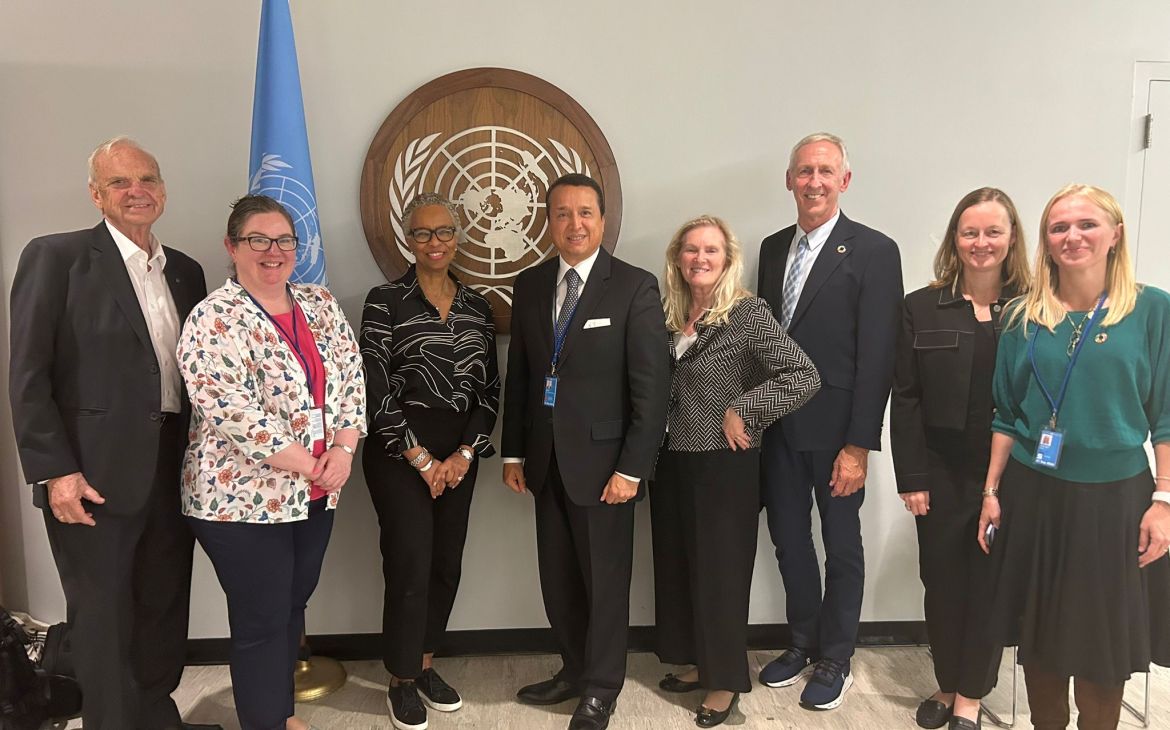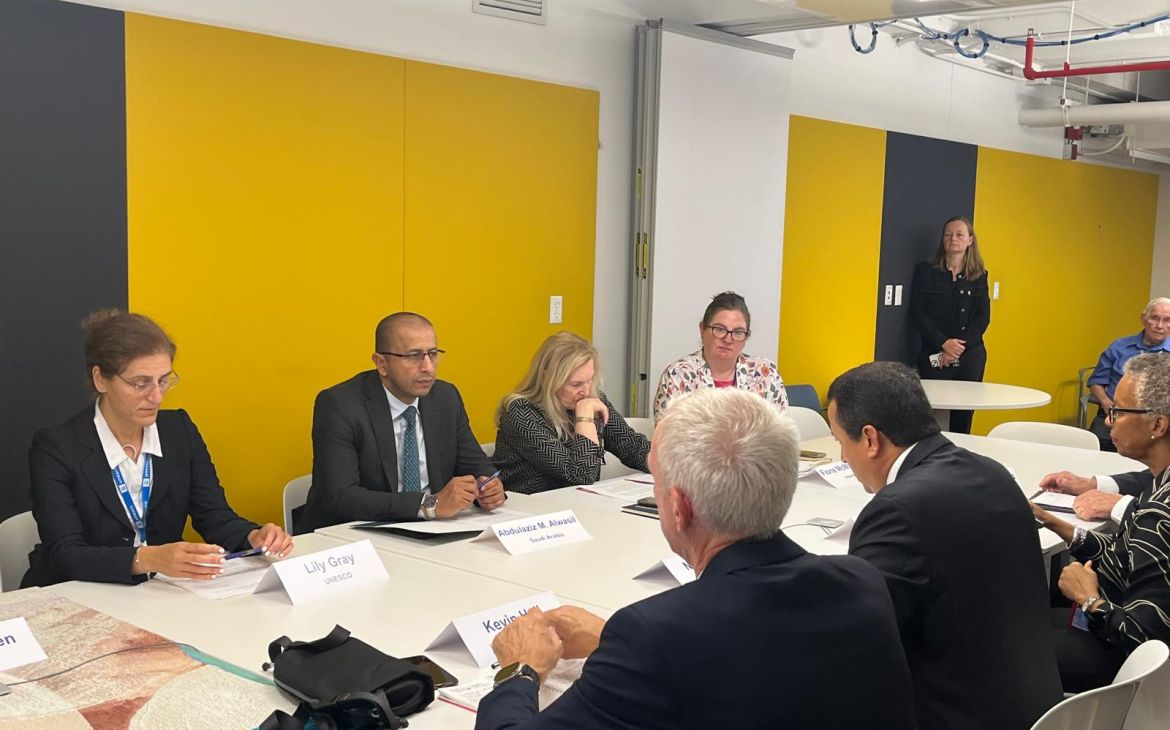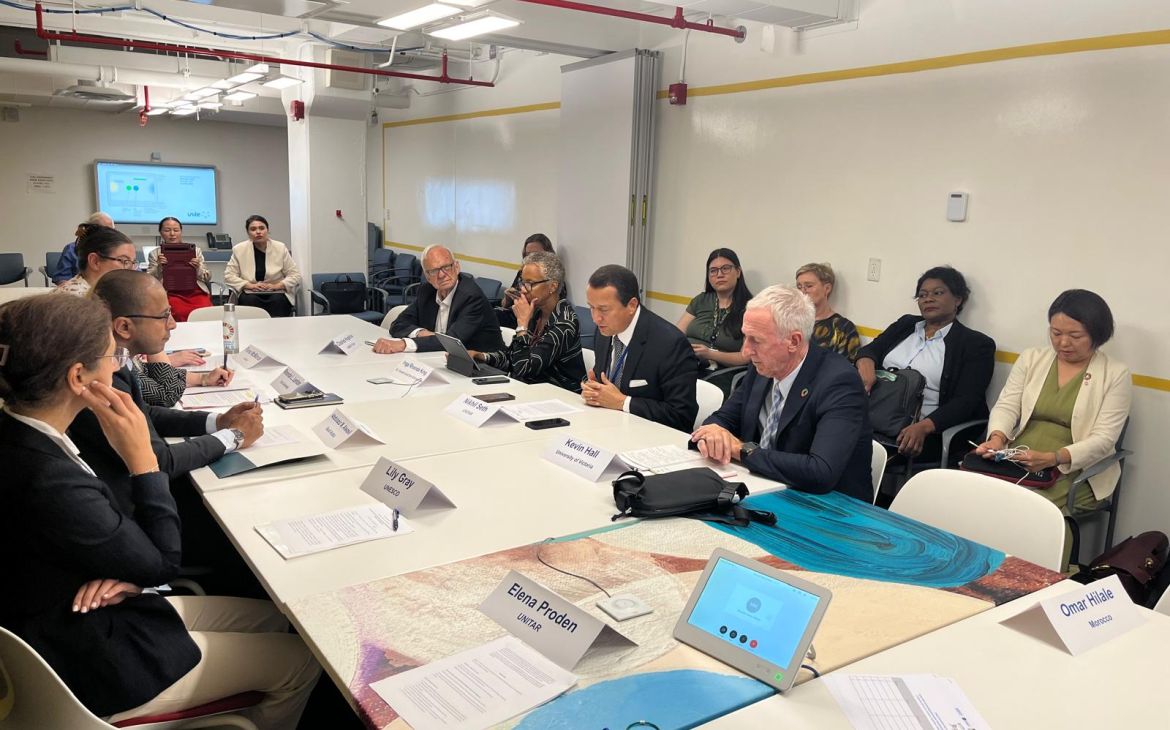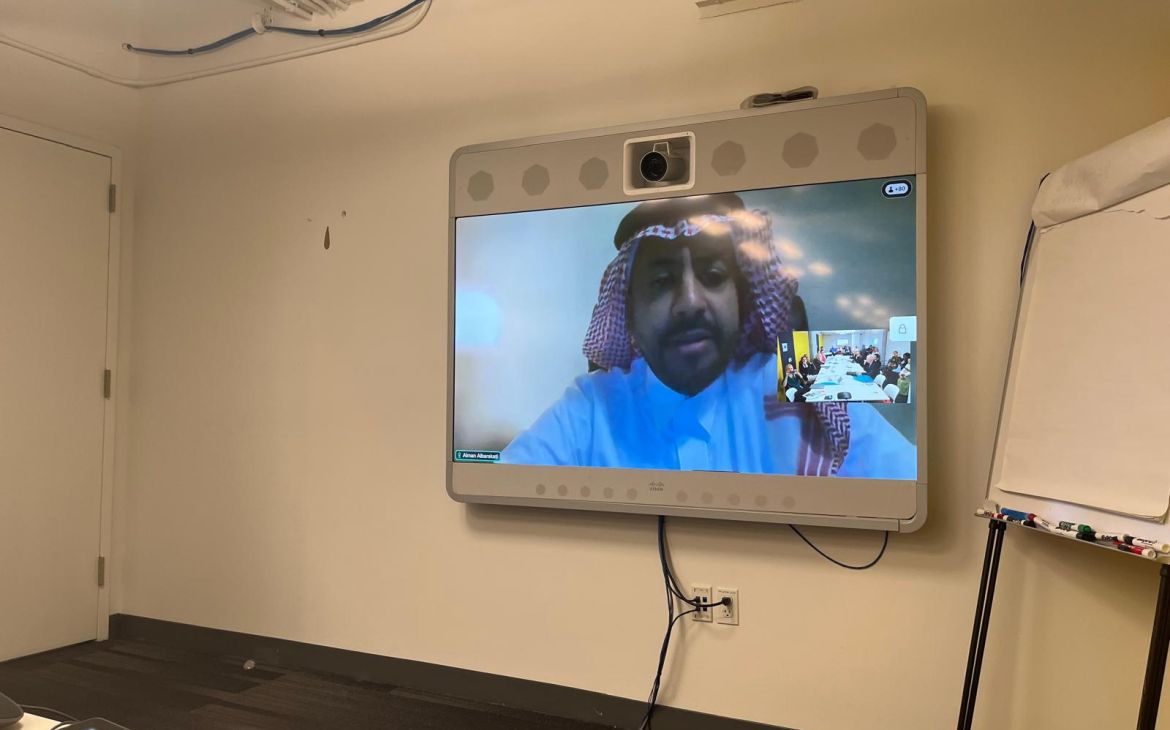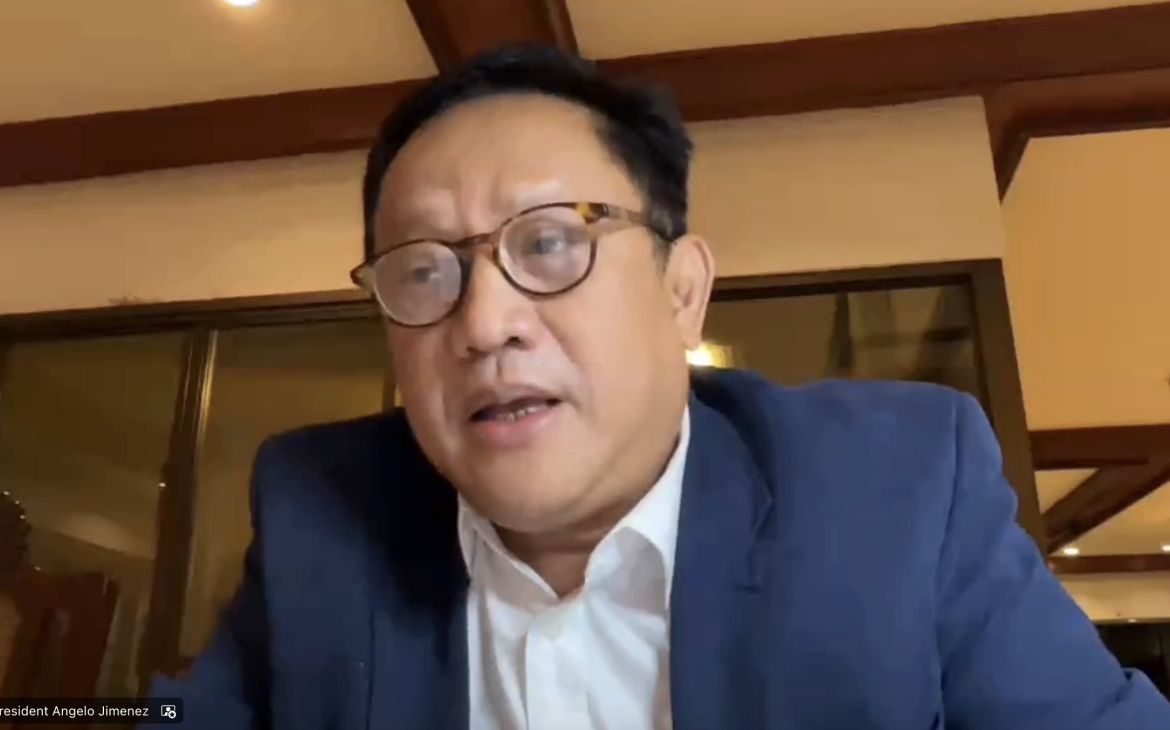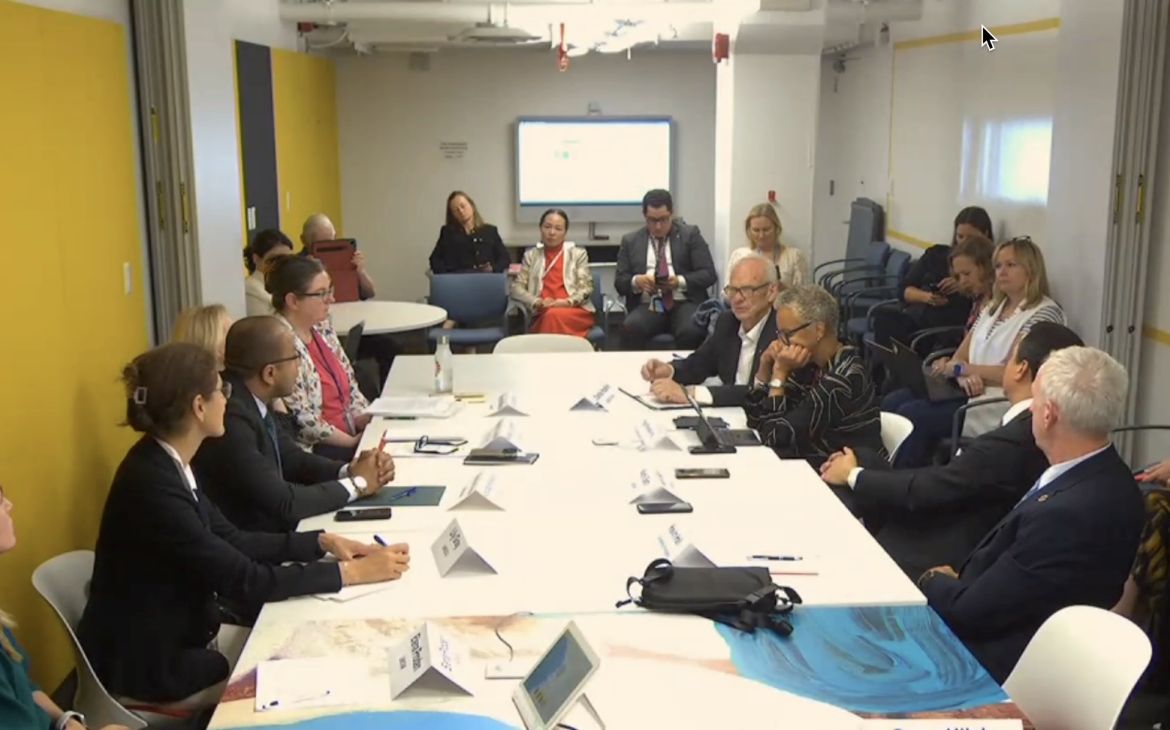"LEAP-FAST: Accelerating Sustainable Transformations through Higher Education Networks"
In a call for action, leaders from around the globe gathered for a hybrid side event during the Action Days of the Summit of the Future, focusing on the transformative role of higher education in advancing the Sustainable Development Goals (SDGs). The event, held on September 21, 2024, marked the official launch of the Certificate Programme of the LEAP-FAST initiative—an ambitious global alliance aiming to position higher education institutions as vital agents of sustainable transformation. Higher Education Leaders participating in this initiative have earlier produced a Joint Statement with a number of recommendations to strengthen the role of higher education in achieving the SDGs.
Developed in collaboration between UNITAR, UNESCO, the CIFAL Global, and UNESCO Chairs Networks, "Leaders in Higher Education Alliance and Programme - For Accelerating Sustainability Transformations" or LEAP-FAST represents a collective commitment to making higher education a driving force for sustainable futures.
The event has provided an opportunity for the announcement of the launch of the LEAP-FAST Certificate Programme supported by the Government of Saudi Arabia and aimed at empowering higher education institutions to embed sustainability into their curricula. Opening the event, H.E. Mr. Mohammed Abdulaziz H Alateek, Deputy Permanent Representative of Saudi Arabia, underscored Saudi Arabia's dedication to education as a pillar of progress: "Today, we are igniting a beacon of hope and a pathway to a sustainable future". He further highlighted Saudi Arabia's commitment to education, as enshrined in Vision 2030, which prioritizes the development of a knowledge-based, innovative, and sustainable economy. The first two editions of the initiative will be hosted and supported by Majmaah University, Saudi Arabia, as its main academic partner, leading the way and setting a precedent for others to follow. As the host, Prof. Mohammed Alshehri, Vice-Rector for Graduate Studies and Scientific Research at Majmaah University, expressed his excitement over his University's participation in this transformative initiative: "We believe that higher education institutions play a key role in global sustainability efforts," and "LEAP-FAST is designed to put sustainability at the heart of our teaching, research, and community engagement, and we are proud to be among the leaders in this global movement".
With her agency as the key partner, Ms. Lily Gray, Senior Liaison Officer, UNESCO, urged universities to adopt "whole-of-institution" approaches to foster inclusion, sustainability, and innovation across all academic disciplines. "We must work together to provide inclusive and transformative learning experiences," Ms. Gray said, pointing to the need for interdisciplinary research and learning, gender equity, lifelong education, and collaboration across sectors and countries as key components for a sustainable future. In his turn Mr. Mejia, Director of the Division for People at UNITAR, chairing the event noted that "Universities must be at the forefront of societal transformation, leveraging their expertise to accelerate progress towards the SDGs," emphasizing the urgency to better harness the potential of higher education institutions as key accelerators of change.
Dr. Aiman Albarakati, Director of CIFAL Saudi Arabia, and Dr. Elena Proden, the initiative lead at UNITAR, jointly presented the LEAP-FAST initiative and the accompanying Certificate Programme, highlighting the significant role it will play in transforming higher education. Dr. Albarakati emphasized that the LEAP-FAST Certificate Programme is designed to equip educators with the tools to embed sustainability competencies across curricula, learning content, and assessment methods. Dr. Proden referred to the Joint Statement from participating University leaders initially presented at the 2024 High-Level Political Forum on Sustainable Development (HLPF) side event, as “ a collective call to action that underscores the need for higher education institutions to reimagine leadership for sustainable development" and “a blueprint for transforming higher education institutions into powerful agents of sustainable development”. The LEAP-FAST initiative is designed as a global movement aiming to expand the reach of the initiative to more Higher Education Institutions across different regions and countries.
At the origins of the initiative and its active Advisor Group member, Professor Charles Hopkins, UNESCO Chair at York University, echoed the need of transformation, emphasizing that universities must shift their approach to make a real impact on sustainability and that a shift from “teaching sustainability” to “teaching for sustainability” is critical. "The challenge for us is to understand that the traditional approaches to higher education—teaching in disciplinary silos—are no longer sufficient," said Hopkins. "We need to reorient our entire education system towards sustainability, where students learn through practical engagement and transdisciplinary collaboration... Higher education institutions must work with communities, governments, and industries to co-create knowledge that is both meaningful and actionable. "If we don’t transform by design, we will be transformed by disaster. This is our opportunity to rethink and engage with those potential leaders", he warned the audience.
One of the challenges LEAP-FAST is trying to address is the disparity between institutions in the Global North and South, with Universities from developing countries insufficiently included in international research and education partnerships. The LEAP-FAST initiative brings together a diverse group of higher education institutions from around the globe and countries in different situations with most active members from Saudi Arabia, Australia, Canada, Kenya, Philippines, Ireland, Costa Rica, Mauritius, Thailand, Turkey, and more recently Senegal and the Caribbean region with the University of West Indies. H.E. Ms. Inga Rhonda King, Permanent Representative of Saint Vincent and the Grenadines, highlighted the importance of bridging the North-South divide to ensure equal access to quality education and knowledge-sharing opportunities: "We need to use initiatives like LEAP-FAST to foster partnerships between developed and developing countries, empowering universities everywhere to contribute to sustainable development." Ambassador King echoed the UNESCO chair by pointing to the importance of rethinking how to teach for sustainability: “We must interrogate what a good life is today and bring our youth into that conversation."
President Atty. Jimenez of the University of the Philippines has challenged the academic community to make research more accessible: "How many of you are willing to offer open access to your research? This is critical for us in the developing world." The University of the Philippines works with the local communities, and they've seen thousands of lives saved since they came out with the results of their research on flooding and the respective maps. President Atty. Angelo Jimenez also emphasized the importance of empathy in university-community partnerships, particularly for marginalized communities. He called on universities to engage directly with communities to implement research-driven solutions that address local needs. "Universities today have to emphasize community action, based on empathy and respect for local cultures, priorities, and knowledge".
Several speakers outlined practical measures to transform higher education in support of the SDGs in the hope that the LEAP-FAST initiative can contribute to their future realization. Dr. Kevin Hall, President of the University of Victoria, Canada, called for integrating sustainability into all aspects of university life, including curricula, research, and student engagement, and reimagining higher education by moving from traditional disciplinary silos to a transdisciplinary approach that incorporates practical, mission-driven projects: "We need to transition from University 1.0 to University 2.0, modernizing governance, funding models, and our entire approach to education. We can no longer afford to operate with the same structures we used centuries ago." To maintain relevance, Universities also need, Dr. Hall noted, to better embed themselves in the continuum of education, from K-12 to lifelong learning, and foster genuine partnerships.
Dr. Rhonda L. Lenton, President of York University, addressed the challenges facing higher education in terms of equitable access, outdated structures, and limited funding. "We need to realize that what we are facing are transformational challenges," she said. "We cannot succeed if we do not look at partnerships across sectors—between private industry, government, and higher education. It is these relationships that will allow us to truly transform." Dr. Lenton emphasized the importance of changing how universities engage with students, promoting lifelong learning, and leveraging the potential of young people to drive sustainable change.
In her role as a government representative, Ms. Fiona McManus, Assistant Principal at the Department of the Environment, Climate, and Communications in Ireland, also highlighted the importance of collaboration between academia and government providing examples of Ireland's SDG stakeholder forum and the SDG Champions programme. "The recognition of higher education institutions as living laboratories for the future of society is crucial," Ms. McManus said. "It is clear that education is fundamental to the future of people and the planet, and it is through partnerships and community engagement that we will achieve the SDGs."
It is hoped that the LEAP-FAST initiative will support the dialogue with policymakers and other communities, as well as required transformations of higher education to position it as a driving force for sustainable development. By leveraging the unique position of higher education institutions, the LEAP-FAST initiative will ultimately aim to equip future generations with the knowledge, skills, and mindset needed to tackle the world's most pressing challenges.
Please read The Joint Statement to learn more about key messages from participating Higher Education Institutions.
Announcement
13 September 2024, Geneva, Switzerland - The United Nations Institute for Training and Research (UNITAR) and the United Nations Educational, Scientific and Cultural Organization (UNESCO) in collaboration and support from the Kingdom of Saudi Arabia and CIFAL Global Network are organizing an official side event during the Action Days titled "LEAP-FAST: Accelerating Sustainable Transformations through Higher Education Networks”. The side event will take place in a hybrid mode on Saturday, 21 September 2024, from 1:15 pm to 2:30 pm in Room GA-3B-760-1, UNHQ GA Building (Basement - 3B Level, room 760-1).
The Pact for the Future defines the 2030 Agenda as a blueprint for sustainable futures and meeting the needs of present and future generations. Yet, humanity is off track on the SDGs, and there is a need to accelerate their implementation. The Pact recognizes the important contributions of young people “as critical agents of change in promoting sustainable development, human rights and peace and security” and calls for “investment in universal, accessible, quality and inclusive education, at all levels”.
Higher education can be a key accelerator in the achievement of sustainable futures for all. Fully harnessing its potential will require better partnerships with governments, the private sector, and civil society.
The side event will showcase a UNITAR-UNESCO initiative Leaders in Higher Education Alliance and Programme – For Accelerating Sustainability Transformations (LEAP-FAST) that aims to position higher education – through UNESCO Chairs and CIFAL Global Networks - as a critical enabler for accelerating progress on sustainable development. The initiative engages higher education leaders in a process of collective reflection on how to advance sector transformations, and strengthen partnerships at local, national and global levels.
The event will launch a Certificate Programme supported by Saudi Arabia as a concrete solution to strengthen investment in education and empower faculties to develop educational models based on inclusive and transformative learning experiences. This high-impact Certificate Programme was specifically designed to reshape institutional practices, reimagine educational programmes, and innovate pedagogical approaches by integrating critical sustainability competencies in the cognitive, socio-emotional, and behavioural domains. It champions transdisciplinary collaboration and new ways of knowing while advancing sustainability, inclusion, and global citizenship. Senior faculty members will engage in cross-disciplinary initiatives, co-create transformative curricula with students, and collaborate with executive leadership to ensure the programme’s strategic alignment. The programme will also address the psychological levers of change.
Moreover, this initiative emphasizes the importance of global cooperation among higher education institutions, fostering strategic alliances between developed and developing nations, including small island developing states and lower-income countries. Supported by the Kingdom of Saudi Arabia, the Certificate Programme seeks to enhance strategic investment in education and empower academic leaders to design inclusive, forward-looking educational models. This effort also contributes directly to advancing the objectives outlined in the Pact for the Future, reinforcing leadership commitment to sustainable development at the highest level.
This side event will provide space for an exchange between University leaders and policy-makers on the roles of higher education in promoting sustainable development and successful models of harnessing its full potential such as the LEAP-FAST initiative drawing on successful University networks.
Please register for the event using this link. Once registered, you will receive an email with instructions on how to connect online and get to the venue if in-person. Please note that the in-person participation is possible only for those who have already registered for the Action Days of the Summit of the Future.
Agenda
Chair: Mr. Nikhil Seth, UN Assistant Secretary-General, Executive Director, UN Institute for Training and Research (UNITAR)
Opening remarks (15 min.)
H.E. Mr. Abdulaziz M. Alwasil, Ambassador Extraordinary and Plenipotentiary, Permanent Representative of Saudi Arabia to the United Nations
Ms. Lily Gray, Senior Liaison Officer, UNESCO New York Office
Announcement of the LEAP-FAST Certificate Programme (10 min.)
Official announcement by Rector of Majmaah University Prof. Saleh Al-Mezal (online)
Short presentation of LEAP-FAST Leadership Joint Statement and Certificate Programme by Dr. Aiman Albarakati, Director, CIFAL Saudi Arabia (online), and Dr. Elena Proden, Senior Specialist, UNITAR
Panel Discussion (45 min.)
- H.E. Ms. Inga Rhonda King, Ambassador Extraordinary and Plenipotentiary, Permanent Representative of Saint Vincent and the Grenadines to the United Nations in New York
- Prof. Charles Hopkins, UNESCO Chair in Reorienting Education towards Sustainability, York University
- Atty. Angelo Jimenez, President, University of the Philippines (online)
- Dr. Kevin Hall, President, University of Victoria
- Dr. Rhonda L. Lenton, President of York University
- Ms. Fiona McManus, Assistant Principal, Department of the Environment, Climate and Communications, Ireland
Feedback (20 min.)
Concrete initiatives and practices (25 min.)


